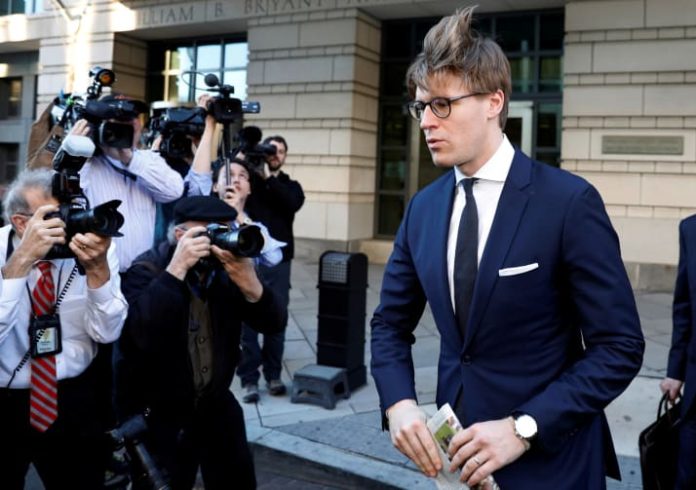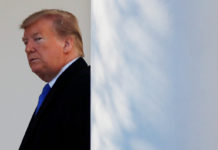 Yuri Gripas / Reuters
Yuri Gripas / Reuters
Alex van der Zwaan at the DC federal courthouse after entering his guilty plea in February.
The first defendant to be sentenced in the Trump-Russia investigation likely will spend little if any time in prison partly because special counsel Robert Mueller declined to charge him with obstruction of justice — even though he deleted an email that prosecutors say was critical to Mueller’s investigation.
In a court memorandum filed last week laying out the case against Alex van der Zwaan, a London lawyer who’s to be sentenced on Tuesday, lawyers from Mueller’s office don’t link him to allegations of Russian interference in the presidential campaign. Instead, they cite Mueller’s probe into Paul Manafort and Rick Gates, two members of Trump’s campaign apparatus who’ve been indicted for money laundering and other crimes unrelated to their campaign work.
But the memorandum also says that van der Zwaan knew when he deleted a Russian-language email from Sept. 12, 2016, that the person who’d sent it — a business associate of Manafort and Gates referred to as “Person A” — was alleged to be a former member of the Russian military’s GRU intelligence agency. According to the special counsel’s office, the FBI determined Person A still had ties to Russian intelligence in 2016. The memo also says van der Zwaan “lied repeatedly” during questioning in November about phone conversations he’d had with Gates and the alleged former Russian agent in September and October 2016.
Federal judge Amy Berman Jackson could sentence van der Zwaan to up to five years in prison, but a far shorter sentence is expected. Estimated federal guidelines call for zero to six months. Van der Zwaan is asking for no jail time; Mueller’s office didn’t advocate for a specific sentence in its memorandum but argued the judge shouldn’t rule out incarceration.
“He’s probably not going to go to jail,” former federal prosecutor Randall Eliason told BuzzFeed News.
That’s because van der Zwaan avoided charges of both obstruction of justice and of violating lobbyist disclosure laws for his work with Gates in 2012 when Manafort and Gates allegedly were lobbying US officials on behalf of a pro-Russian Ukrainian political leader, Viktor Yanukovych. Mueller indicated in court filings that he had evidence van der Zwaan violated both laws but agreed not to bring charges as part of van der Zwaan’s guilty plea on Feb. 20.
 Joshua Roberts / Reuters
Joshua Roberts / Reuters
Van der Zwaan lied about his contacts with Rick Gates, a former Trump campaign aide.
Van der Zwaan’s treatment by Mueller raises many questions, including the possibility that he quietly helped prosecutors, though he does not have an agreement to cooperate with Mueller as part of his guilty plea. Trump’s former national security adviser Michael Flynn agreed to help Mueller when he entered a guilty plea last year, delaying his sentencing. Former Trump campaign adviser George Papadopoulos does not have a formal cooperation agreement with Mueller, but before pleading guilty last year, he provided prosecutors with information that has helped them pursue leads. He also promised to continue helping them.
Van der Zwaan, 33, is the son-in-law of billionaire German Khan, an owner of one of Russia’s largest investment groups, Alfa Group. Khan is suing BuzzFeed News over the publication of the so-called Steele dossier, which mentions him.
Van der Zwaan “has a wealth of information and extensive contacts in Russia and Ukraine,” said Kenneth McCallion, a New York City lawyer who represented Yanukovych’s Ukrainian rival, Yulia Tymoshenko, in the early 2010s.
Van der Zwaan also may have benefited from other factors such as being the first defendant to be sentenced and being a Dutch citizen. Foreign nationals in US prisons can ask for a transfer to their home country, where authorities make their own determination about…










